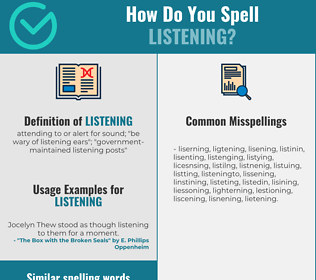LISTENING Meaning and
Definition
-
Listening is the act of focusing one's attention on the sounds or words emitted by someone or something. It involves actively perceiving and understanding auditory stimuli in order to comprehend the intended meaning behind spoken words, sounds, or music. In a broader sense, listening encompasses not only the physical act of hearing, but also the mental and cognitive processes involved in deciphering and making sense of the information received.
Effective listening entails giving full attention to the speaker, maintaining eye contact, and demonstrating genuine interest in what is being communicated. It involves not only the reception of sound waves through the ear, but also the interpretation, comprehension, and evaluation of the message conveyed.
Listening is a crucial component of effective communication, as it facilitates understanding, empathy, and the exchange of ideas. It is a valuable skill that can enhance personal relationships, professional interactions, and overall communication competence. Active listening involves responding to the speaker through verbal and nonverbal cues, such as nodding, asking questions, or providing feedback, to indicate understanding and engagement.
Listening can be categorized into different types, such as empathetic listening, critical listening, or appreciative listening, depending on the purpose and approach taken. It plays a vital role in creating connections, resolving conflicts, gaining knowledge, and fostering mutual understanding in various contexts, including interpersonal relationships, education, counseling, and business settings. By honing one's listening skills, individuals can develop stronger relationships, become more informed, and ultimately improve their ability to effectively interact with others.
-
• The act of listening or giving attention.
Etymological and pronouncing dictionary of the English language. By Stormonth, James, Phelp, P. H. Published 1874.
Top Common Misspellings for LISTENING *
* The statistics data for these misspellings percentages are collected from over 15,411,110 spell check sessions on www.spellchecker.net from Jan 2010 - Jun 2012.
Other Common Misspellings for LISTENING
Etymology of LISTENING
The word "listening" originated from the Middle English word "listning", which can be traced back to the Old English word "hlysnan". In Old English, this term was used to describe the act of paying attention or hearkening to sounds or voices. The Old English word "hlysnan" itself is derived from the Proto-Germanic word "hlusnōną". The word has undergone various changes in spelling and pronunciation over the centuries, but its fundamental meaning of actively receiving and perceiving sounds has remained consistent.
Idioms with the word LISTENING
-
I’m listening
The idiom "I'm listening" is a phrase used to indicate that someone is paying attention and actively engaged in hearing and understanding what others are saying. It implies that the person is open to receiving information, opinions, or concerns, and is ready to respond or take action if needed.
-
I'm listening
Similar spelling words for LISTENING
- glistening,
- listener,
- lichtenstein,
- liston,
- listen,
- listen in,
- listing,
- lighting,
- lighten,
- lightning,
- lightening.
Conjugate verb Listening
CONDITIONAL
I
would listen
we
would listen
you
would listen
he/she/it
would listen
they
would listen
FUTURE
I
will listen
we
will listen
you
will listen
he/she/it
will listen
they
will listen
FUTURE PERFECT
I
will have listened
we
will have listened
you
will have listened
he/she/it
will have listened
they
will have listened
PAST
I
listened
we
listened
you
listened
he/she/it
listened
they
listened
PAST PERFECT
I
had listened
we
had listened
you
had listened
he/she/it
had listened
they
had listened
PRESENT
I
listen
we
listen
you
listen
he/she/it
listens
they
listen
PRESENT PERFECT
I
have listened
we
have listened
you
have listened
he/she/it
has listened
they
have listened
I
am listening
we
are listening
you
are listening
he/she/it
is listening
they
are listening
I
was listening
we
were listening
you
were listening
he/she/it
was listening
they
were listening
I
will be listening
we
will be listening
you
will be listening
he/she/it
will be listening
they
will be listening
I
have been listening
we
have been listening
you
have been listening
he/she/it
has been listening
they
have been listening
I
had been listening
we
had been listening
you
had been listening
he/she/it
had been listening
they
had been listening
I
will have been listening
we
will have been listening
you
will have been listening
he/she/it
will have been listening
they
will have been listening
I
would have listened
we
would have listened
you
would have listened
he/she/it
would have listened
they
would have listened
I
would be listening
we
would be listening
you
would be listening
he/she/it
would be listening
they
would be listening
I
would have been listening
we
would have been listening
you
would have been listening
he/she/it
would have been listening
they
would have been listening
Infographic
Add the infographic to your website:





